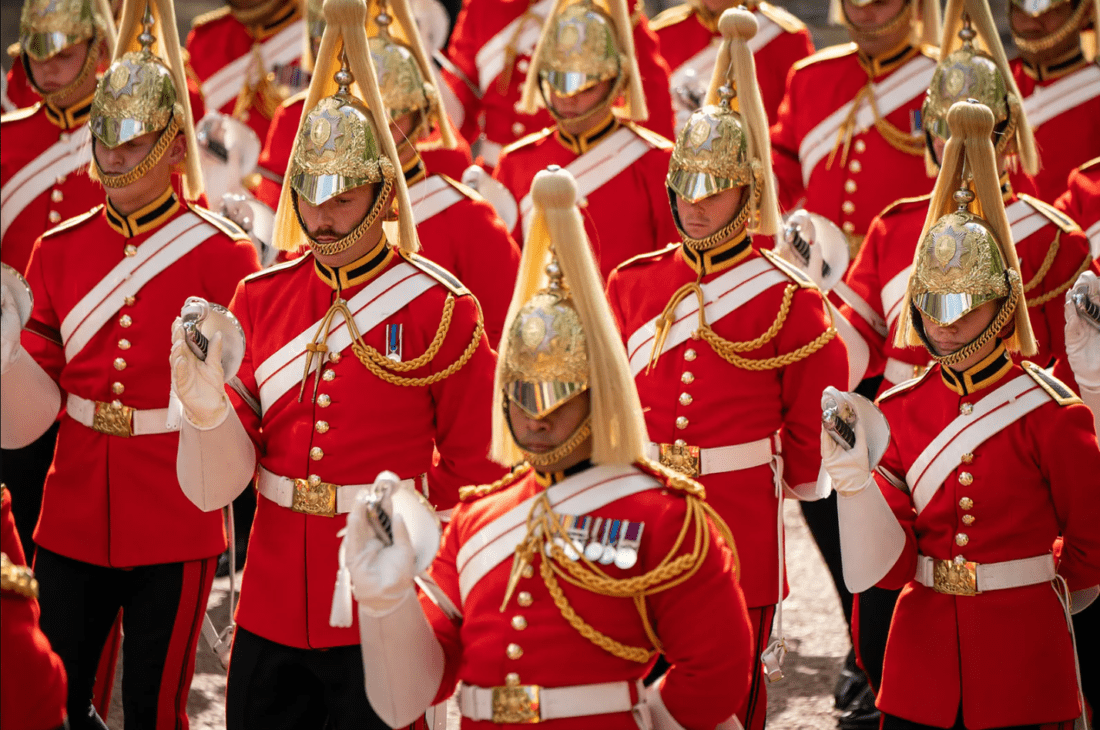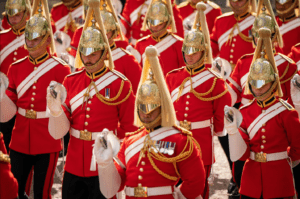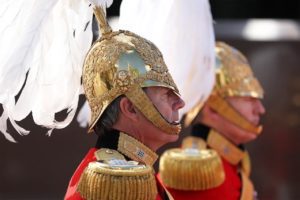
The Powerful Imagery of Pageantry
Reading Time: 4 minutesAccording to the BBC, an astonishing four billion people worldwide tuned into the funeral of Her Majesty The Queen and over 32 million people in the UK alone watched at least some of it, us included. We found the experience both sad, yet inspirational. An era was over but what we were looking at was an incredible display of history and continuity, not least in the military uniforms of the nearly 4,500 members of the British Armed Forces. It certainly was military glamour at its best!
Military uniforms have a long and storied past. Take for example, the Light Dragoon’s attire with a cross belt running from the left shoulder to the right of the head, where 200 hundred years ago the soldiers would have stored their cartridges, or the silver Albert helmets of the Household Cavalry introduced by Queen Victoria’s husband Prince Albert in 1842. Military uniforms are passed from generation to generation; some are given back when the original wearer leaves the service and carefully stored so that with no more than a nip, tuck and polish, they can be ready for the next user. The British Armed Forces, it seems, have long understood the value of recycling and the circular economy.
 Body of the Life Guards of the Household Cavalry, during the ceremonial procession from Buckingham Palace to Westminster Hall – pa images
Body of the Life Guards of the Household Cavalry, during the ceremonial procession from Buckingham Palace to Westminster Hall – pa images
How impressive was the sea of crimson red on show – a colour long associated with monarchs, cardinals and emperors. Did you know that it first appeared on the Continent during the 16th Century when the Spaniards introduced a Mexican method for creating a vivid red dye from cochineal insects and it soon became Europe’s third most in-demand import, second only to gold and silver. It was very expensive, so it became associated with luxury, a symbol of affluence and power. A British army kitted out in scarlet reflected well on its monarch; it may even have helped to distinguish our soldiers from the enemy in battle.
At Fashionizer, we loved working with vibrant crimson red when we created the doorman coats for Belmond Cadogan, making a bold statement of connection with the Chelsea Pensioners who live nearby and are famous for their red coats We are also using it to great theatrical effect in a new project launching in early 2023.
Photographs of the state funeral also showcased the power of pattern – captivating images of repeating red, navy and white shapes, over-sized gold epaulets and shining medals. According to Gestalt Principles our brains seek patterns and remember them. This theory has become a guiding maxim for all kinds of designers, including ourselves when we use repetition and patterns in our bespoke uniform fabric designs to convey clients’ brand values.
We wholeheartedly agree with Elizabeth Wilhide, the prolific author of books on design and decoration, when she says: “Lively or sedate, free-flowing or rigorously ordered, pattern is where colour and texture meet and make music.”
 Honourable Corps of Gentlemen at Arms – Richard Heathcote/getty images
Honourable Corps of Gentlemen at Arms – Richard Heathcote/getty images
Finally, the Fashionizer team must admit to a particular thrill….. seeing the incredibly intricate details of many of the military uniforms was a talking point in our studio for quite a few days following the bank holiday. Of course, this level of craftmanship makes the costumes very costly to produce and unlikely to be practical in our hospitality settings. However, it was a reminder that it is attention to detail which marks out great tailoring, with or without gold embroidery.
It also made us think about the importance of meticulous care – an interesting topic these days when laundry costs are in the news. Each service person is required to spend a lot of time polishing and pressing their uniforms. Lack lustre boots and creased tunics are not an option. Something, I am sure, that hospitality staff are not too keen on….
Comments: 0






